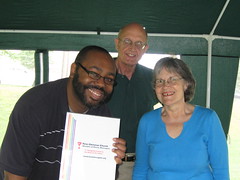The church where I'm the Associate Pastor (First Christian Church in Minneapolis) is considering becoming an official Open and Affirming Congregation in the Christian Church (Disciples of Christ). The congregation has a long history of welcoming gay and lesbian folk into the life of the congregation, so in many ways they have been a living example of being Open and Affirming. I wrote this for the church newsletter sharing why the church should take this next step. My one frustration is that I really didn't do as good a job on making a theological case. The text is below.
So, What’s the Big Deal?
At
the April board meeting, a proposal was put forward to have First
Christian become officially an Open and Affirming congregation. For
those who are unaware, Open and Affirming is a network of churches
within the Christian Church (Disciples of Christ) that openly welcome
gays and lesbians.
This
isn’t the first time First Christian has considered this. Whenever the
issue has been brought up, there is a common refrain that I hear: “we
already welcome gays and lesbians. Why do we need make this step?”
I
understand this because I’ve seen how you have lived out your welcome
to everyone that enters the door of the church. You have welcomed gay
and lesbians to not only worship and participate in the life of the
congregation, but you have also supported having LBGT persons in
positions of leadership. Speaking as an openly gay man, I am ever
thankful for your acceptance of me and allowing me to be one of your
ministers. So, I don’t doubt for a moment that you while you might not
wear the name “Open and Affirming” on your sleeves, you live it out in
your daily walk. You truly believe that God welcomes everyone to the
Table and you put that faith into action.
So, why should First Christian take this step?
I have two reasons: one is more practical and the other more theological.
People
wonder why we need to publicly welcome gay people in a way that we
don’t do when it comes to other groups such as African Americans or
Hispanics. The difference though is that being gay is somewhat
different that being African American. You all know that I’m African
American by looking at me. But you can’t tell by looking at me that I’m
also gay. Being gay can be somewhat of a “hidden” difference. You
can’t really tell someone is gay until they say they are gay. Because
it is hidden, this leads to a lot of assumptions. If a young woman
comes to church, people might assume she either has a boyfriend or
husband instead of thinking she might have a girlfriend. Also because
there has been a history of churches not being so friendly to
homosexuals which causes gays and lesbians to assume that a church is
not friendly towards them- unless there is a visible sign that says they
are welcomed.
The
second reason is theological. The ministry of Jesus and later the
ministry of the church was one that tended to cross various boundaries.
Jesus engaged people who were outside of the Jewish community he was
born into. He talked to Samaritans and Romans and always brought
salvation to those who crossed his path. The early church also was led
by the Holy Spirit to minister to the wider Roman world, which was a
melting pot of various ethinicities. The church of the 21st century is
also a diverse place, and the Spirit calls us again to go out and
minister to various cultures, preaching the message of salvation in
Christ. Welcoming gay and lesbians publicly is a way of stating that
the gospel is for them as much as it is for anyone else. The apostles
of the early church were witnesses to the saving acts of Christ, and two
millenia later, we are still called to be witness to the Jesus we
encounter.
In
the words of the design of the Christian Church, First Christian really
has “In Christ's name and by his grace we accept our mission of witness
and service to all people.” We have lived our inclusive witness of the
Gospel of Jesus Christ. I think it might be something we want to tell
the whole world about.


No comments:
Post a Comment